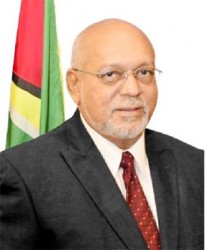While tacitly acknowledging that corruption exists in state-run agencies, Guyana’s President Donald Ramotar says efforts to tackle corruption in the society must also focus on “the business community” where he says “the bribers are located.
“We have to deal with it [corruption] from both ends. We must make this intolerable. We must make the morality of our society strong enough for anyone to resist giving a bribe and for any official to resist accepting a bribe,” President Ramotar declared at the Wednesday April 17 opening session of a Financial Crimes Stakeholder forum co-sponsored by the United States Embassy, the British High Commission, the Canadian High Commission, and the European Union Delegation in Guyana.

President Ramotar’s insistence that the business sector be made to shoulder some of the blame for the prevalence of corrupt practice comes against the backdrop of the widely-held view that official corruption in Guyana is driven largely by a deal-making culture local involving state functionaries and business operators. A city businessman who attended the opening ceremony told Stabroek Business that the President’s remarks had not dealt with the issue fully. “Much of the bribery and corruption particularly of the type that has to do with the evasion of taxes and duties has developed out of a system that involves both state officials and businessmen. There are some businessmen who will tell you that the bribers, as the President calls us, are playing with a weak hand,” the informant told Stabroek Business.
Seemingly intended to send a signal that the Ramotar administration is being nudged towards upping the ante on financial crimes by the country’s bilateral partners, last Wednesday’s forum saw the participation of state and local private sector officials as well as officials of the US Treasury Department, the Caribbean Financial Action Task Force (CFATF) and the Caribbean Criminal Assets Recovery Programme.
While this is not the first occasion since his accession to office that President Ramotar has pronounced on the issue of official corruption, his reference last week to “bribers” in the business sector raises questions as to whether the government may not now be preparing to distance itself from the stigma of financial malpractices, money-laundering and other corrupt practices.
Under Jagdeo’s presidency some state institutions, notably the Guyana Revenue Authority (GRA) had been rocked by various corruption-related scandals, most of which involved collusion between GRA employees and business operatives, though the outcomes were never attended by comparable arrests and prosecutions.
A prominent private sector official who attended last Wednesday’s forum and with whom this newspaper subsequently spoke said President Ramotar’s pronouncement on the role being played by the business sector in driving corruption was only “half of the equation”. He said that “what the President did not say was that when you deal with certain state functionaries and institutions you really have no choice but to pay bribes to get things done. It’s a system in which two sets of people participate,” the businessman said.
Over time the US administration has repeatedly voiced its concern over what it appears to regard as mounting evidence of financial crimes and other corrupt practices in both the state and business sectors. Last year’s US State Department money-laundering report lambasted Guyana as “a transshipment route for South American cocaine and heroin destined for the United States” and as part of the route “for cash returning to South America”. The report says “historically weak law enforcement and judiciary systems coupled with endemic corruption and increasing organised crime activity contribute to a favourable climate for significant money laundering in Guyana,” the primary sources of laundered funds being “narcotics trafficking”.
At last week’s forum US Ambassador D Brent Hardt honed in on what the US Government sees as a continual blurring of the line between legitimate business and criminal pursuits reflected in elaborate ‘front’ enterprises set up as covers for drug-smuggling and money-laundering operations.
As if to make the point that Washington believes that sections of the Guyana economy are fuelled by illegal enterprises the US envoy alluded to the desirability of ensuring that Guyana “keep[s] its economy in the hands of legitimate businesses, hard-working entrepreneurs and law-abiding citizens,” a pursuit for which the political administration here has, over the years, received a decidedly unflattering report card.
In recent years, it has become commonplace for investments in large urban business enterprises including multi-storey structures to be attended by diligent speculation as to whether the funds for such enterprises might not be proceeds some illegal pursuit.
Ordinary Guyanese have long become cynical about explanations for frequent and elaborate displays of wealth in circumstances where the authorities appear to turn a blind eye to calls for at least some measure of official enquiry into what often appears to be sudden and inexplicable windfalls. A point has even been reached where some businesspeople have come to believe that they are under pressure to prove that their businesses are legitimate and above board.
By pointing to what he says is the role of business operatives as ‘bribers,” President Ramotar may well be sending his administration’s earliest signals that, burdened down by the weight of international condemnation and the concern that corruption may reach a point where potential investors might be persuaded to give Guyana a wide berth, it is ready to begin to work with its external partners to unravel the networks that comprise both state and private sector functionaries and which continue to fuel financial crimes and other forms of corruption in Guyana.
At last week’s forum the President conceded that Guyana was anxious that the initiatives taken to stem the tide of such crimes bear such fruit stating that further legislative initiatives would be forthcoming as soon as the debate on the 2013 budget is concluded.









